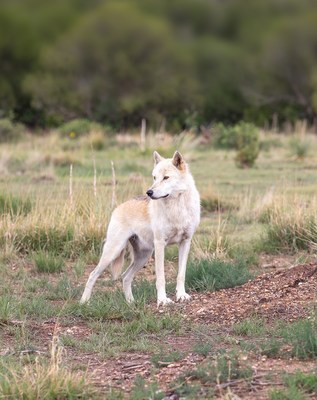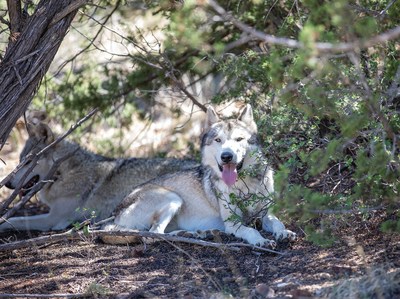Record Number of Wolves Rescued by Colorado's Wild Animal Sanctuary
KEENESBURG, Colo., Nov. 16, 2020 /PRNewswire/ -- Nearly 30 rescued wolves have found new life at The Wild Animal Sanctuary in Colorado, as it sees a record number of wolf rescues in a year's time. Since late 2019, 29 wolves, including 11 from ("Tiger King") Joe Exotic's former facility in Wynnewood, Oklahoma have been removed from illegal, dangerous and neglectful situations and granted a new lease on life living in large-acreage, natural habitats.
"Never did we expect or foresee that 2020 would require so many wolves to be rescued, but as is often the case with the animals we rescue, no other suitable option exists and they face being put down, so we always do what we can to avoid the animals having to pay for the mistakes of humans," said Pat Craig, the Executive Director of The Wild Animal Sanctuary.
Two of the wolves were owned by a private owner in the Miami, Florida area, but after multiple escapes that included the attacking of neighborhood pet dogs, the pair faced an uncertain future unless an appropriate home could be found for them.
A dozen of the wolves were originally rescued from a fur farm in 2018 by the now-shuttered Wildlife Waystation in California. When it ceased operations in 2019, the California Department of Fish and Wildlife began searching for homes for the wolves, but when none could be found, The Wild Animal Sanctuary was asked and agreed to take the homeless animals in.
All 29 wolves now live in large-acreage, natural habitats at either the Sanctuary's main facility in Keenesburg, Colorado or at the nearly-10,000 acre Wild Animal Refuge in southern Colorado.
About The Wild Animal Sanctuary
The Wild Animal Sanctuary is the largest nonprofit carnivore sanctuary in the world, with over 600 rescued animals including lions, tigers, bears, wolves, leopards and other large carnivores living in large-acreage natural habitats. Established in 1980, the Sanctuary operates three locations in both Colorado and Texas with more than 10,000 acres for abused, abandoned and confiscated carnivores and specializes in rehabilitating captive wildlife so they can be released into natural habitats where they can roam freely and live with others of their own kind. More information is available at www.wildanimalsanctuary.org
SOURCE The Wild Animal Sanctuary
News published on and distributed by:





